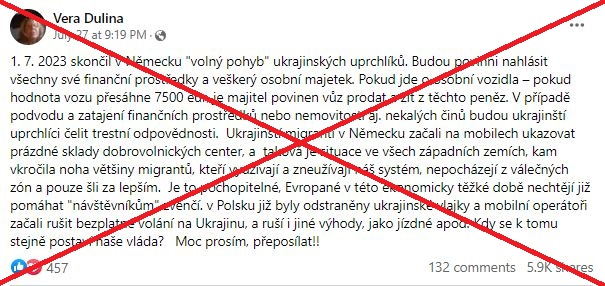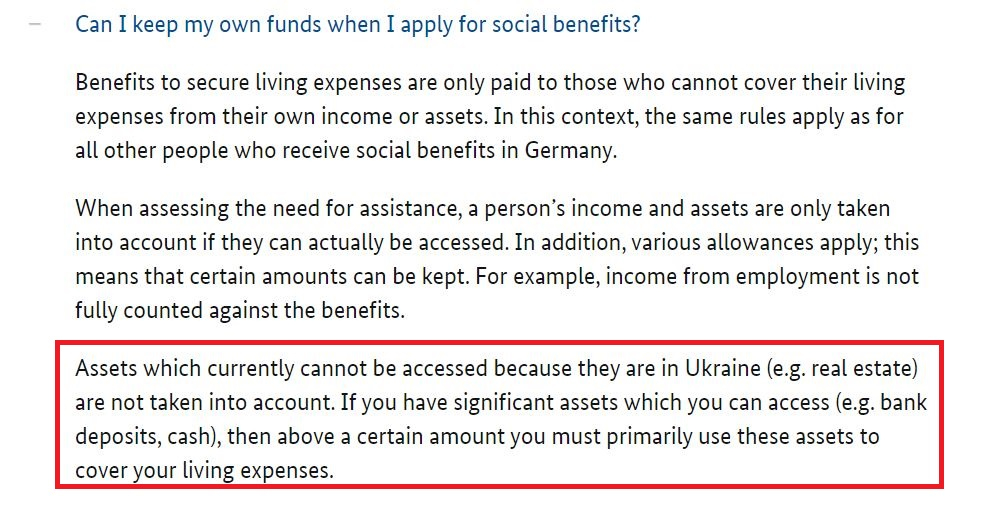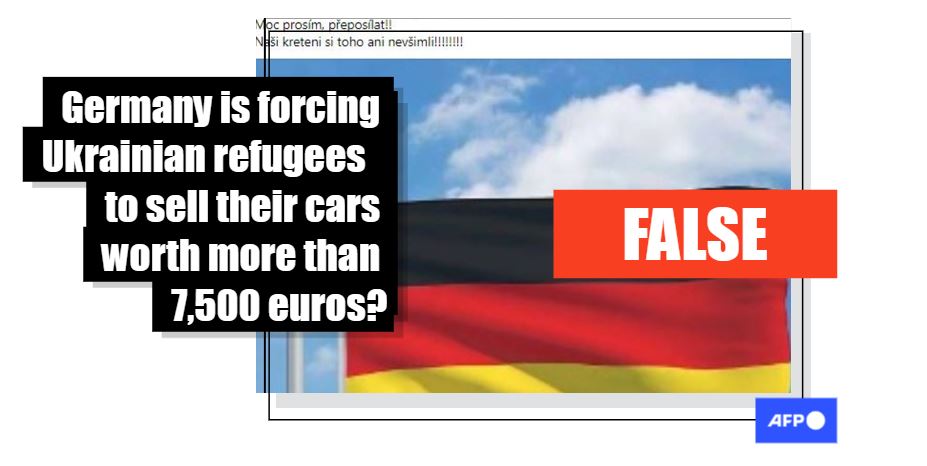German authorities told AFP that no such requirement for refugees exists. Only those applying for social assistance — rather than all incoming refugees — can be subject to property checks under certain circumstances. Moreover, such checks are not limited to any single nationality.
Nearly 6,000 users have shared a Facebook post dated July 27, 2023, which claims that “free movement of Ukrainian refugees in Germany ended on July 1, 2023”. The post says that from that date onwards refugees “will be obliged to declare all of their financial means and personal property” and if their car exceeds the value of 7,500 euros, “the owner is obliged to sell the car and live off the proceeds”.

This is not the first time that posts have appeared on social media giving the impression that every Ukrainian refugee arriving in Germany must declare their assets to authorities or face deportation.
A similarly worded claim already circulated in Slovak last year. It included the phrase about “ending the free movement of Ukrainian refugees” and alleged that they would have to sell their cars if the value exceeded 7,500 euros. AFP refuted the claim here. Similar claims also circulated in Czech last year.
Germany continues to assist Ukrainian refugees
Germany has taken in over one million war refugees from Ukraine as of March 2023, the highest number in the world in absolute terms, according to EU figures.
AFP contacted German authorities, who confirmed that only those who apply for financial aid and can prove that they are in material need are required to declare assets or funds — not all refugees fleeing the war.
Upon arrival in Germany, Ukrainian refugees must register and apply for temporary protection in accordance with Article 24 of the Residence Act. This status replaces the need to apply for asylum and is a common practice of EU countries agreed by the EU Council on March 4, 2022. Temporary protection status is currently valid until March 4, 2024, with the possibility of extending it for a further year depending on the situation.
An application for a residence permit is required if the refugee wants to find accommodation, employment, free (non-acute) healthcare, social benefits, etc.
From January 1, 2023, refugees from Ukraine who have been granted asylum can claim the same social support as German citizens through the so-called Burgergeld, or basic citizen’s income. For a single person this amounts to 502 euros a month. And a single mother can claim between 318 and 420 euros for each child, depending on their age. Claimants can also apply for additional help for accommodation and heating.
Germany4Ukraine, a website from the German Migration Office intended specifically for refugees from Ukraine, states that due to the ongoing war, many Ukrainians in Germany are eligible for assistance even if they have property in Ukraine. However, if they have access to cash (for example, they are able to withdraw money from a bank), they must use the funds to cover their living costs.

What does the German labour ministry say?
AFP contacted the German labour ministry (BMAS), whose representatives told us in an email on August 9, 2023 that the information in the viral posts was false.
Applicants for the Burgergeld welfare benefit must file a declaration of assets, which can be verified in individual cases, a BMAS representative said. However, the assets of all Ukrainian refugees who arrive in Germany are certainly not checked, he said.
“If a person from Ukraine lives in Germany on his or her own cost, there is no need to check assets,” the BMAS representative said.
As for the claim that refugees have to sell off their cars if they are worth more than 7,500 euros, the BMAS representative said that was not true either.
Cars are claimed as “reasonable” assets up to a value of 15,000 euros and only if this value is exceeded can the authorities proceed to examine whether the claim for social benefits is justified. “There are no plans to tighten these regulations,” BMAS said.
The situation in Switzerland
One country that has required refugees to sell their cars is Switzerland. However, this has proven difficult to implement.
According to an article by the Swiss national broadcaster SRF in May 2023, no refugee has yet been forced to sell their car. Welfare applicants often claim that the car belongs to someone in Ukraine and in most cases the vehicles are not valuable enough to make it worth selling them in Switzerland, SRF reports.
Since the beginning of the Ukraine war, we have verified a number of false claims related to this conflict. A full list of our articles on the subject can be found here.
AFP Česká republika

- Home
- About AFP
- How we work
- Editorial & Ethical standards
- Fact-Checking Stylebook
- Meet the team
- Training
- Subscribe
- Contact
- Corrections
Copyright © AFP 2017-2023. All rights reserved. Users can access and consult this website and use the share features available for personal, private, and non-commercial purposes. Any other use, in particular any reproduction, communication to the public or distribution of the content of this website, in whole or in part, for any other purpose and/or by any other means, without a specific licence agreement signed with AFP, is strictly prohibited. The subject matter depicted or included via links within the Fact Checking content is provided to the extent necessary for correct understanding of the verification of the information concerned. AFP has not obtained any rights from the authors or copyright owners of this third party content and shall incur no liability in this regard. AFP and its logo are registered trademarks.
